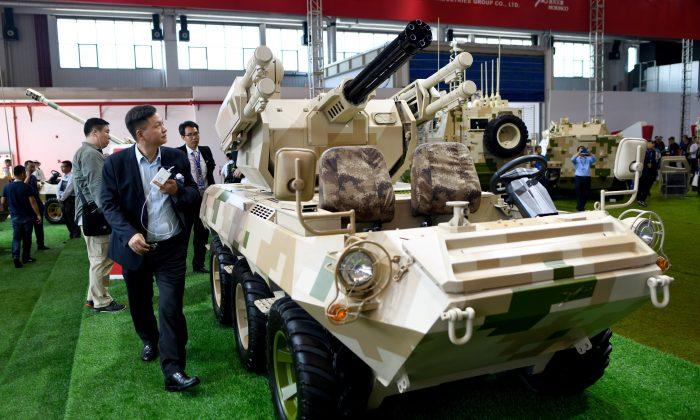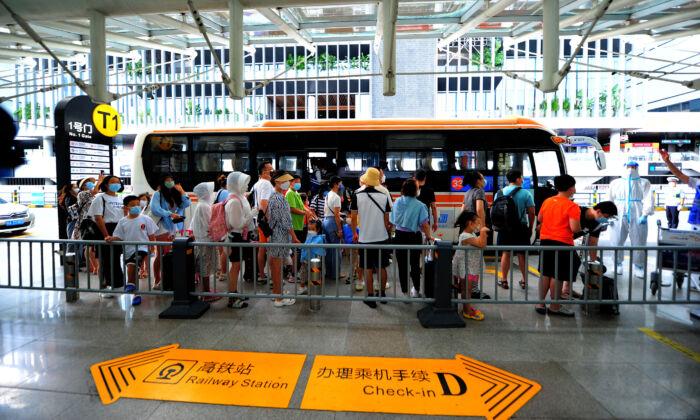The Chinese regime aims to be the global leader in artificial intelligence (AI) technology, but this has alarmed the West. The Beijing Institute of Technology (BIT), China’s top weapon’s research institute, recruited 31 talented students from across the country to participate in its new AI weapons education and training program.
The goal of the program, which began on Oct. 28, is to create China’s future leaders and experts in AI and robotic weaponry.
Some experts describe this education program as “extremely powerful and troubling.” There is growing concern over China’s AI technology.
The BIT website reported that the opening ceremony of the first “intelligence weapons system experimental program” was held on Oct. 28 at the exhibition hall of North China Industries Group Corporation Limited (Norinco). Norinco is China’s main manufacturer of weapons and various military products.
31 students were enrolled in the program, with instructors from various academic groups: the Chinese Academy of Sciences, China Engineering Academy, Chang Jiang Scholars Program, and Thousand Talents Plan. BIT reported that the opening ceremony was hosted by Bao Liying, the deputy secretary of BIT Communist Party Committee.
According to Sina, more than 5,000 high school students applied, but only the most “patriotic” and talented were admitted into the program.
The program is to be completed in four years. During the first semester, students will learn about weapons and warfare technology through theoretical and practical applications—they will be guided by two senior experts of the field, one from a university and the other from the military defense industry. At the end of the first semester, students will choose their area of specialization—such as mechanical engineering and AI weapons design. They will then be assigned to the relevant defense research labs where they will develop skills through hands-on experience.
Upon completion of the program, students will receive a Masters degree. They can continue onto doctoral programs and become China’s future innovators and leaders in AI weaponry.
BIT has also partnered with universities abroad. According to its admissions guide, students can choose to study in one of the top 100 universities from around the world.
As an incentive, students can receive a yearly scholarship (10,000 yuan, $1,450) upon successful completion of the course.
The students are under 18 years of age, 27 of the them are boys and four are girls. “These kids are all exceptionally bright, but being bright is not enough...a passion for developing new weapons is a must…and they must also be patriots,” South China Morning Post quoted a BIT professor.
“We must blaze a new trail, and do what others have not done before,” read the BIT website.
Growing Concern
“This is the first university program in the world designed to aggressively and strategically encourage the next generation to think, design and deploy AI for military research and use,” Eleonore Pauwels, a Research Fellow on Emerging Cybertechnologies at United Nations University Centre for Policy Research, told South China Morning Post. “This concept is both extremely powerful and troubling.”“Think of robot swarms capable of delivering harmful toxins in food or biotech supply chains,” Pauwels said. Pauwels said that China’s development of AI weaponry could lead to a new form of warfare from cyberattacks to an “internet of Battle Things”—where an array of robots and sensors play a role in defense, offense and in collecting intelligence.
Stuart Russell, an American computer scientist and AI expert from the University of California, Berkeley told South China Morning Post that BIT’s program is “a very bad idea” because “machines should never be allowed to decide to kill humans...weapons quickly become weapons of mass destruction...they increase the likelihood of war.”
After the United States, China is the world’s second most advanced AI country, especially in security and defense areas. But AI research and development is one of Beijing’s most guarded secrets. The newest AI event is an example.
“The implications of our adversaries’ abilities to use AI are potentially profound and broad,” Asia Times quoted Dan Coats, the director of U.S. National Intelligence in February.
Since 2017, Chinese leader Xi Jinping continued to talk about AI in manufacturing, medical, agriculture, as well as defense.
The People’s Liberation Army Daily reported on Aug. 9, 2017 that AI will be the third generation of weapons, following gunpowder and nuclear weapons.
In February, Hong Kong media quoted an anonymous Chinese weapons expert who said that China is using AI technology to develop an unmanned nuclear submarine. In detail, he said that by 2020, China will deploy a giant submarine which can carry out complex missions without on-board human control.
In March, China tested an unmanned tank. State media CCTV showed an ageing Type-59 tank fitted with new remote control technology and seemingly being driven by a soldier sitting at a nearby control deck. CCTV said the Chinese military was investigating how to network the tanks to aircraft and satellites to work in a quicker and more lethal way than human driven versions.
China pledged to be the global leader in AI by 2030, but using AI technology in producing weapons is a threat to the world.






Friends Read Free